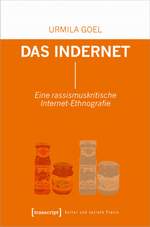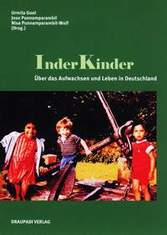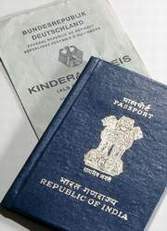Mittwoch, 15. Februar 2006
Innocent carricatures
urmila, 00:31h
In Germany we also have a small carricature crisis. To criticise the deployment of the German army during the football world championship following carricature was posted:
Which reads: "The reason why during the championship ... the army has to be deployed."
The carricaturist Klaus Stuttman now claims that this carricature is not about 'Muslims' at all but just commenting on a domestic issue. (And that is in fact what most 'Germans' including me see on the first glance.) He is surprised that he has received massive hate mails and that the Iranian Embassy has interferred.
With the following carricature he depicts himself as the innocent carricaturist who is hit by unforeseen reactions:
which reads: "Carricaturist - in - the age - of - the internet - and of - globalisation"
I find it quite surprising that he could not foresee the reactions. The world is 'burning' in reaction to the Mohammed carricatures published by Jyllands-Posten and this carricaturist does not know he is moving in a sensitvie area? This would be dangerous ignorance.
But if one reads his explanation of what is happening and looks at older carricatures drawn by him, then one notices that he does not seem to have any sensitiveness towards 'Muslim' feelings, the feelings of the 'othered'. He merely considers the whole issue to be one of misunderstandings and different senses of humour.
The problem I see is that he repeatedly uses 'Islamic' images as a metaphor for something negative when commenting on domestic issues which are not related to 'Islam' at all. He does not seem to understand that this usage is problematic even when he does not directly carricature 'Islam' in his work.
Which reads: "The reason why during the championship ... the army has to be deployed."
The carricaturist Klaus Stuttman now claims that this carricature is not about 'Muslims' at all but just commenting on a domestic issue. (And that is in fact what most 'Germans' including me see on the first glance.) He is surprised that he has received massive hate mails and that the Iranian Embassy has interferred.
With the following carricature he depicts himself as the innocent carricaturist who is hit by unforeseen reactions:
which reads: "Carricaturist - in - the age - of - the internet - and of - globalisation"
I find it quite surprising that he could not foresee the reactions. The world is 'burning' in reaction to the Mohammed carricatures published by Jyllands-Posten and this carricaturist does not know he is moving in a sensitvie area? This would be dangerous ignorance.
But if one reads his explanation of what is happening and looks at older carricatures drawn by him, then one notices that he does not seem to have any sensitiveness towards 'Muslim' feelings, the feelings of the 'othered'. He merely considers the whole issue to be one of misunderstandings and different senses of humour.
The problem I see is that he repeatedly uses 'Islamic' images as a metaphor for something negative when commenting on domestic issues which are not related to 'Islam' at all. He does not seem to understand that this usage is problematic even when he does not directly carricature 'Islam' in his work.
1 Kommentar in: english ... comment ... link
Montag, 13. Februar 2006
Other Americans
urmila, 20:50h
Today I watched the documentary John & Jane. It portrays 'Indian' call center agents. It shows how they talk with 'American' customers, how they study 'American' lifestlye, how they train the 'American' accent. And how then they go back home to the 'Indian' reality. Spooky.
0 Kommentare in: english ... comment ... link
Identification with 'our' values
urmila, 15:50h
I am lucky that I already have the German citizenship. Conservative politicians demand that those who want to get it identify with 'our' values. But I have always been against the discrimination of minorities, against homophobia and sexism. I do not want to share these 'values'. I have to accept the freedom of opinion of the conservative politicians, but I do not need to share their opinion. At least not so far, as I am already a German citizen. Or are they already discussing the denaturalisation of those who do not conform?
0 Kommentare in: english ... comment ... link
Sonntag, 12. Februar 2006
The succes of Jyllands Posten
urmila, 19:57h
The Danish right populist party has gained support through the carricature crisis. Its leader has warned the 'Danes' about the enemy inside the country, i.e. the 'Muslims'. They should accept 'Danish' traditions and values, and should not want to change the 'Danish' society.
If it is a 'Danish' value to provoke a minority and keep on until it is provoked, then maybe the 'Danish' society needs some change?
If it is a 'Danish' value to provoke a minority and keep on until it is provoked, then maybe the 'Danish' society needs some change?
0 Kommentare in: english ... comment ... link
Samstag, 11. Februar 2006
The appropriation of 'authentic' researchers
urmila, 22:52h
At the moment some researchers are much demanded in Germany. These are 'authentic' researchers who belong to an ethnic minority, to be more precise who have a 'Muslim' background. And who work on 'Muslim' migrants in Germany. But it is not enough to do that. There are many who do and who do not get any attention. The public attention is guaranteed as soon as these 'authentic' researchers locate problems among the 'Muslim' migrants and - this is important - argue that the causes for these are to be found in their religion, in 'Islam'. This is much appreciated by the majority 'Germans', finally they have 'authentic' evidence for their islamophobia.
The other researchers, who belong to an ehnic minority, and who offer other explanations for problems, or who even worse do not consider issues liked 'forced marriages' or 'honour killings' as the most important fields for research, they are not 'authentic'. They are just envious of the 'authentic' ones, and in case of doubt they are also responsible for the problems.
Becoming an 'authentic' researcher would be a good career chance. But I doubt that I have the necessary qualifications.
The other researchers, who belong to an ehnic minority, and who offer other explanations for problems, or who even worse do not consider issues liked 'forced marriages' or 'honour killings' as the most important fields for research, they are not 'authentic'. They are just envious of the 'authentic' ones, and in case of doubt they are also responsible for the problems.
Becoming an 'authentic' researcher would be a good career chance. But I doubt that I have the necessary qualifications.
2 Kommentare in: english ... comment ... link
Freitag, 10. Februar 2006
How does a German become a German?
urmila, 16:32h
asks the 'German' journalist Bettina Gaus today. And goes on to argue that the debate about naturalisation is a debate about the 'German' identity.
But is it really? Are being 'German' and getting the 'German' citizenship related?
Naturalisation does not make one into a 'natural' 'German'. A 'German' although undefined is something different than a German citizen. He (and also she) is 'White', 'Christian' and several other vague ideas associated with 'Germanness' which can be best defined when they are missing. Attributes which one cannot acquire via legal naturalisation.
The German citizenship cannot convey these. But it gives the right to active political participation. Thus it is important. For those who apply for it. And for those who do not want to grant it?
But is it really? Are being 'German' and getting the 'German' citizenship related?
Naturalisation does not make one into a 'natural' 'German'. A 'German' although undefined is something different than a German citizen. He (and also she) is 'White', 'Christian' and several other vague ideas associated with 'Germanness' which can be best defined when they are missing. Attributes which one cannot acquire via legal naturalisation.
The German citizenship cannot convey these. But it gives the right to active political participation. Thus it is important. For those who apply for it. And for those who do not want to grant it?
0 Kommentare in: english ... comment ... link
Aggressive tolerance
urmila, 16:25h
The British journalist Neal Acherson questions today the 'Western' claim to protect tolerance in the dispute about the carricatures. He asks whether this is not only a pretence. Whether the real issue is not that the 'old' inhabitants mistrust the 'newcomers' and do not want to share their welfare with them.
0 Kommentare in: english ... comment ... link
Donnerstag, 9. Februar 2006
Opinion of the press
urmila, 22:19h
In the last few weeks I was quite often irritated with my favourite newspaper the 'Tageszeitung'. This supposedly 'left' and 'green' paper gave to much space - for my liking - to islamophobic articles. But then today I glanced through another newspaper and saw that comparatively mine is really differentiated and open minded. And it wasn't the worst paper I was looking at either. To be islamophobic seems to be common sense at the moment in Germany. It is really frightening.
0 Kommentare in: english ... comment ... link
Fostering irregular migration
urmila, 20:20h
Germany and most of the other EU countries were doubful about the consequences of the enlargement of the EU in 2004. They were scared about their labour markets. All the East Europeans would certainly rush into the Western countries and take away all the jobs. Thus most countries decided to grant the 'new' (second class) EU citizens only a restricted freedom of mobility.
The EU has now published a report on the consequences of the enlargement on the labour markets. Sweden was the only country to grant full mobility and has benefited from it even though the masses did not come. In the other countries the number of workers without work permits has risen. People who want to migrate, and whose labour force is wanted, migrate no matter what the rules. And when their only option is irregular migration, than they are cheap labour which many employers happily employ. Was that the aim of the restriction?
The EU has now published a report on the consequences of the enlargement on the labour markets. Sweden was the only country to grant full mobility and has benefited from it even though the masses did not come. In the other countries the number of workers without work permits has risen. People who want to migrate, and whose labour force is wanted, migrate no matter what the rules. And when their only option is irregular migration, than they are cheap labour which many employers happily employ. Was that the aim of the restriction?
0 Kommentare in: english ... comment ... link
Mittwoch, 8. Februar 2006
'We' do not want to remember
urmila, 02:32h
On French railway stations an exhibition about deported Jewish children was shown. The organisers wanted to show it also on German railway stations. But the German Railways do not want to. Not enough space, not enough money, to dangerous ...
Why is this reminder of 'our' history so problematic? Who is so much irritated by the exhibition?
Why is this reminder of 'our' history so problematic? Who is so much irritated by the exhibition?
0 Kommentare in: english ... comment ... link
... nächste Seite
 Foto: © Anke Illing
Foto: © Anke Illing




